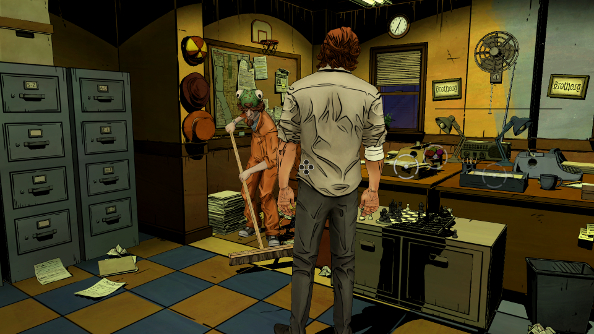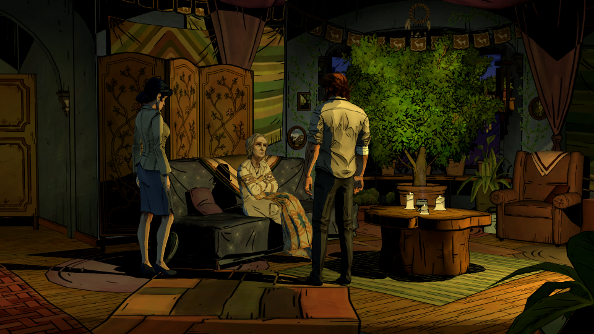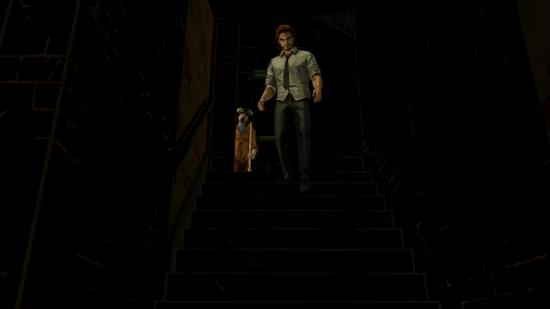The Wolf Among Us: A Crooked Mile begins with a smoldering ball of rage storming out of a hotel. A lot barging, stomping, storming and rushing follows like a very angry race. The aforementioned rage ball, Bigby Wolf, does most of it, but it’s very much an episode focused on the hunt for the Fabletown serial killer, with everyone on a deadline.
The illusion of limited time, split second decisions and everyone just shouting at each other makes the episode a tense affair. It seems like just about every character is primed to flip their lid, utter a battle cry and start ripping throats out.
Nobody comes out of it clean.
Fabletown is not an egalitarian place. The elite – the royals, the administrators, the law, they all get to live up in the clouds, buying glamours and trying to make the most out of their new life. But down below are the monsters, at least in appearance, who can barely afford glamours and resort to hooking or drinking their troubles away.
The undertone of class tension – which is rapidly becoming a lot more than an undertone – casts Bigby in the role of the outsider. The elite give him his paycheque and marching orders, but he’s not one of them. And by working for the proverbial “man”, he loses the trust of those like himself.
He says he wants to help, but all he brings with him is trouble.

Despite the illusory clock, ample time is spent exploring what makes Bigby tick, and if that ticking is actually from a time bomb. Does he care about the murderer’s victims, does he give a damn about the fables, why is he relentlessly chasing the serial killer – answers can be given, but not with great conviction.
Bigby is every bit as lost in New York as the fables who get sent the farm – the ones who can’t fit in. The more time we follow him on his investigation, the more clear it becomes that Bigby is an animal trying to be a man, not a man wrestling with his dual nature. His nature is that of the savage, violent wolf and it’s becoming increasingly hard for him to curtail that nature.
The Wolf Among Us reveals who Bigby is not through dialogue or even his actions – it’s through the quick glances, the changes in facial expression, the pauses in conversation and the words left unsaid. They are the moments where he has to readjust his mask or where he doesn’t know quite what to say, when he’s caught off-guard.

Snow asks if he actually likes these situations, where he’s fighting and shouting and threatening, and that’s why he always gets himself into them. It doesn’t matter what dialogue is chosen, if he denies it, there’s still that look of doubt on his face, the uncertainty in his voice.
The decisions that need to be made – split-second things, with guns ready to go off and knuckles being cracked – have greater weight this time around. With everyone’s temper running hot, the words and actions of Bigby need to be even more carefully chosen than usual, but there’s the nagging sense of time running out. Lives hang on these choices and there’s no clear right call.
Some of the choices lead Bigby down different avenues in his investigation. There are routes not taken, and perhaps clues left undiscovered. Three important locations open up, waiting to be explored, but only two can be tackled by Bigby. I can’t help but wonder what I would have found in the one place he never went to, and whether or not it would have helped salvage what was a pretty terrible day for the sheriff and those under his protection.

A funeral gets ruined, a suspect gets roughed up, and even when Bigby is trying to hold it all together, the cracks appear and quickly become gaping maws where once bottled anger pours out. There are a lot more opportunities for violence than in the previous episode, and Telltale once again excels in crafting tightly choreographed fight sequences that leave one both exhilarated and guilty. It’s empowering. Until you see the faces of the people witnessing a man-shaped animal letting rip, that is.
But for all its violence and fast-paced hunting, A Crooked Mile is elevated by the subtle touches: the chance for Bigby to tell a white lie to spare someone’s feelings, the deer-in-headlights expression he has when he needs to question a precocious little girl and the growing, unspoken relationship between Bigby and Snow. The latter goes beyond the simmering sexual tension – there’s now the question of who is in charge of the investigation and manhunt.
I’m completely invested now. I worry about Bigby. I’m pointlessly going through the decisions he made, I made, attempting to figure out how they will change the way the rest of the fables’ view their protector. But most of all I want to finish this case and catch whoever is responsible for this titanic mess, and then rip his limbs off. Bigby’s indignation and quest for vengeance is infectious.
